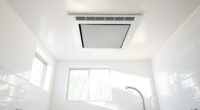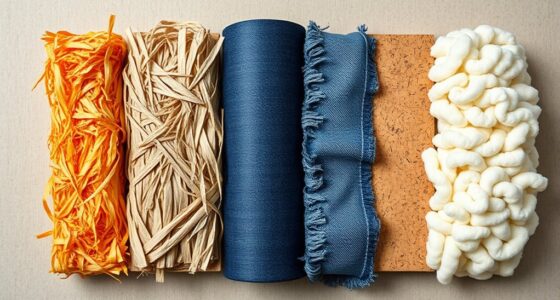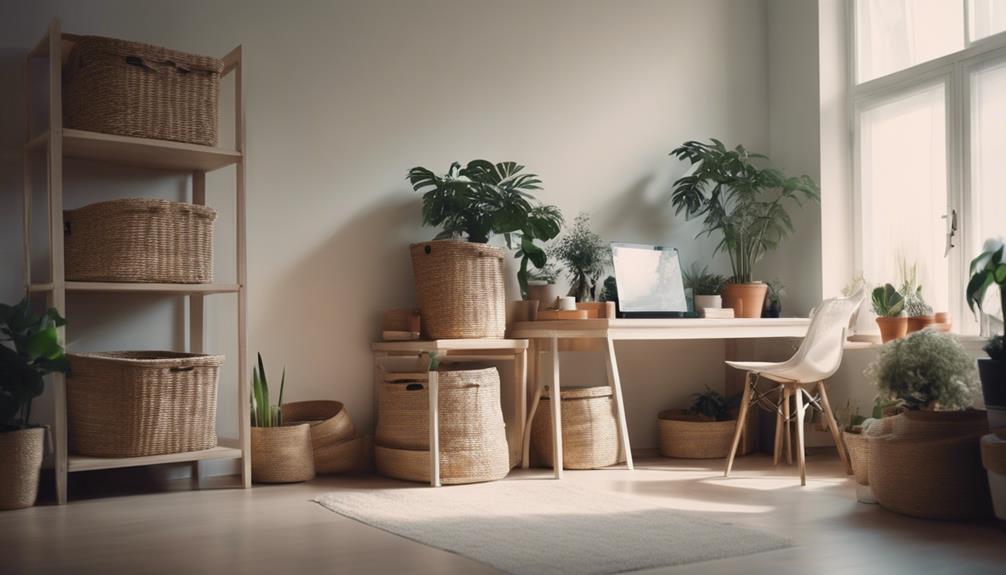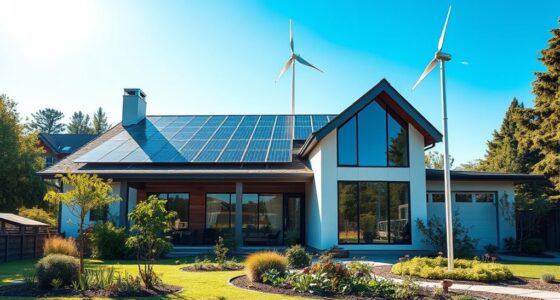To choose the right HEPA filter for allergy-proof living, focus on filters that meet strict HEPA standards and are made from high-quality materials, ensuring they trap particles as small as 0.3 microns like pollen and pet dander. Make sure the filter fits your air purifier properly to prevent unfiltered air from bypassing it. Regular maintenance and timely replacements are key to keeping the airflow ideal and filters effective. Keep exploring for tips on selecting the best filter for your needs.
Key Takeaways
- Ensure the filter meets HEPA standards, capturing particles as small as 0.3 microns for effective allergen removal.
- Check for proper fit to prevent unfiltered air bypass and ensure maximum filtration efficiency.
- Consider filters with additional pre-filter layers to trap larger particles and extend HEPA lifespan.
- Prioritize filters made of high-quality, durable materials for long-term performance and reliability.
- Balance cost with durability and maintenance ease to choose a filter that offers sustained allergen protection.
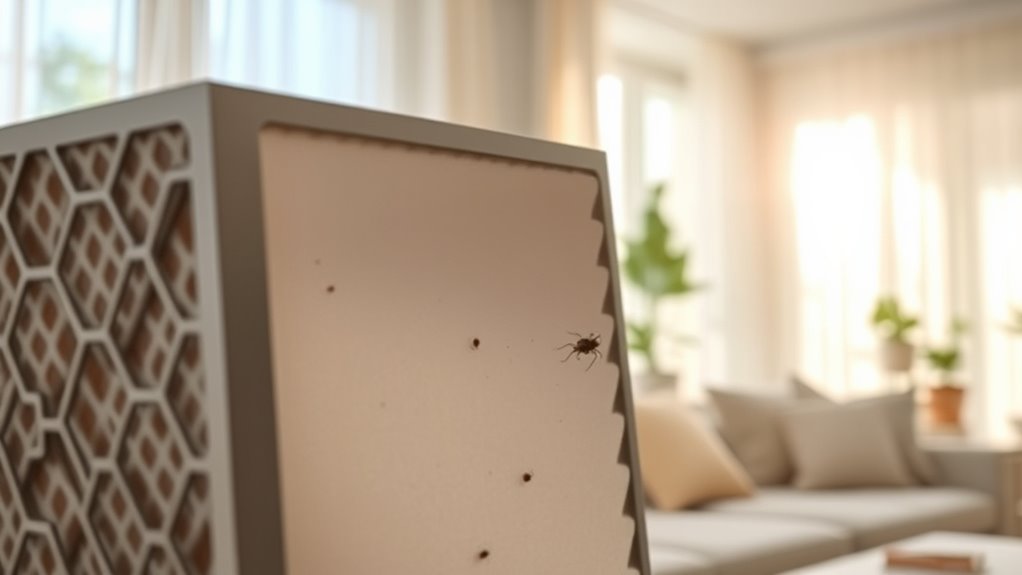
Selecting the right HEPA filter is vital for guaranteeing your air purifier effectively removes airborne particles and improves indoor air quality. When choosing a filter, consider how well it supports airflow enhancement, as this directly impacts the purifier’s efficiency. A filter that allows proper airflow ensures that air moves smoothly through the unit, preventing it from working harder than necessary and reducing strain on the motor. This not only enhances the purifier’s performance but also extends the filter’s lifespan, meaning you won’t have to replace it as frequently. Proper airflow helps trap contaminants more effectively, especially smaller particles like pollen, pet dander, and dust mites, which are common triggers for allergies. Additionally, understanding HEPA standards can help you select filters that meet rigorous performance criteria. Next, pay attention to the filter’s material and design. HEPA filters are made of densely packed fibers that can catch particles as small as 0.3 microns with 99.97% efficiency. Look for filters that are certified to meet HEPA standards, as this guarantees high performance. A well-made HEPA filter with high-quality materials will maintain its filtration capabilities over time, but it’s vital to follow the manufacturer’s guidelines for filter replacement. Regularly changing your filter guarantees that airflow remains at its best and that the filter continues to capture allergens effectively, preventing buildup that could obstruct airflow and reduce filter lifespan. Incorporating advanced filtration technologies can further improve overall air quality by targeting a broader range of pollutants. It is also useful to consider how filter maintenance impacts long-term performance, as neglecting proper upkeep can diminish filtration efficiency. For example, some filters include pre-filters that trap larger particles before they reach the main HEPA layer, which helps extend the lifespan of the primary filter and maintain consistent airflow. Additionally, selecting a filter with proper fit ensures maximum airflow and prevents gaps that could allow unfiltered air to bypass the filter, which is especially important if you’re aiming for allergy-proof living. Some filters come with pre-filters or additional layers that trap larger particles before they reach the HEPA layer, extending the overall lifespan of the main filter and maintaining consistent airflow. Finally, consider the maintenance requirements and cost of replacement filters. While some higher-quality filters might have a higher upfront price, they often last longer and perform better over time, saving you money in the long run. Proper maintenance, including timely replacements, guarantees your air purifier functions at peak efficiency, supporting airflow enhancement and prolonging filter lifespan. By selecting a HEPA filter that balances filtration efficiency, durability, and ease of maintenance, you create a healthier indoor environment that reduces allergens and enhances your overall comfort.
Frequently Asked Questions
How Often Should I Replace My HEPA Filter?
You should replace your HEPA filter regularly to guarantee ideal filter maintenance and maximize its lifespan. Typically, it’s recommended to change the filter every 6 to 12 months, but this can vary depending on usage and air quality. Check your manufacturer’s guidelines, and if you notice reduced airflow or increased allergies, it’s a sign you might need to replace the filter sooner. Regular replacements keep your air clean and healthy.
Can HEPA Filters Eliminate All Airborne Allergens?
Think of HEPA filters as your allergy-fighting superheroes, but even they have their limits. While they excel at capturing common airborne allergens like pollen, dust mites, and pet dander, they can’t eliminate all allergen types or prevent every airborne particle. Air filter efficiency varies, so choosing a high-quality HEPA filter is essential. Remember, no filter is perfect, but the right one can considerably reduce allergy symptoms and improve your indoor air quality.
Are There Specific HEPA Filters for Pet Allergies?
If you’re dealing with pet allergies, look for HEPA filters designed specifically to target pet dander. These filters often have enhanced capabilities to trap tiny allergens that standard filters might miss. When selecting a filter, consider its efficiency rating and whether it’s rated for pet allergens. This guarantees you pick the right filter, improving air quality and making your living space more allergy-proof.
Do HEPA Filters Remove Viruses and Bacteria?
Did you know that HEPA filters can trap particles as small as 0.3 microns? They do a great job at air purification by removing many airborne bacteria and viruses, but they don’t eliminate all pathogens. To keep your filter working efficiently, regular filter maintenance is essential. While HEPA filters improve air quality, remember they’re just part of a thorough health strategy, especially during flu season or viral outbreaks.
What Is the Ideal Size for a HEPA Filter?
The ideal size for a HEPA filter depends on your space and device compatibility. You should consider filter maintenance to guarantee it functions effectively over time. Check the filter’s dimensions to match your air purifier or HVAC system, and ensure compatibility for peak performance. A properly sized filter will maximize air purification, reduce allergens, and keep your living space healthier. Always follow manufacturer guidelines for the best results.
Conclusion
Think of choosing the right HEPA filter as finding the perfect key to open a cleaner, allergy-free home. By understanding your needs and comparing options, you’ll turn your living space into a fortress against allergens. Don’t settle for less—your ideal filter is out there, waiting to sweep away dust and pollen like a gentle breeze clearing storm clouds. With the right choice, you’ll breathe easier and enjoy a healthier, happier home every day.
Amina brings over a decade of journalism experience to her role as Editor-in-Chief. Under her leadership, Exquisite Post has flourished, maintaining the highest standards of integrity and excellence. Amina’s commitment to truth and her visionary approach guide the editorial team in producing impactful news stories that resonate with our audience.

